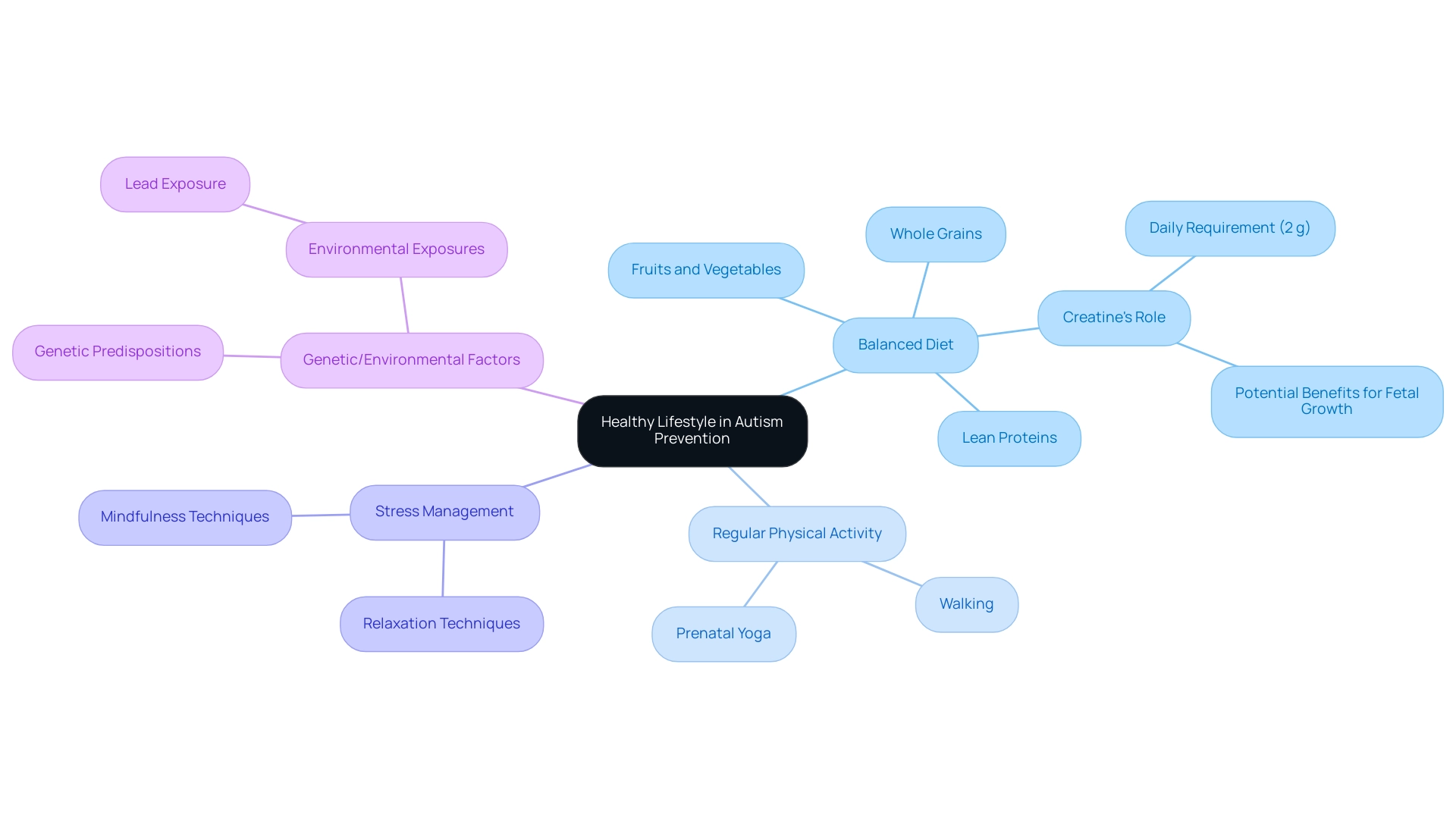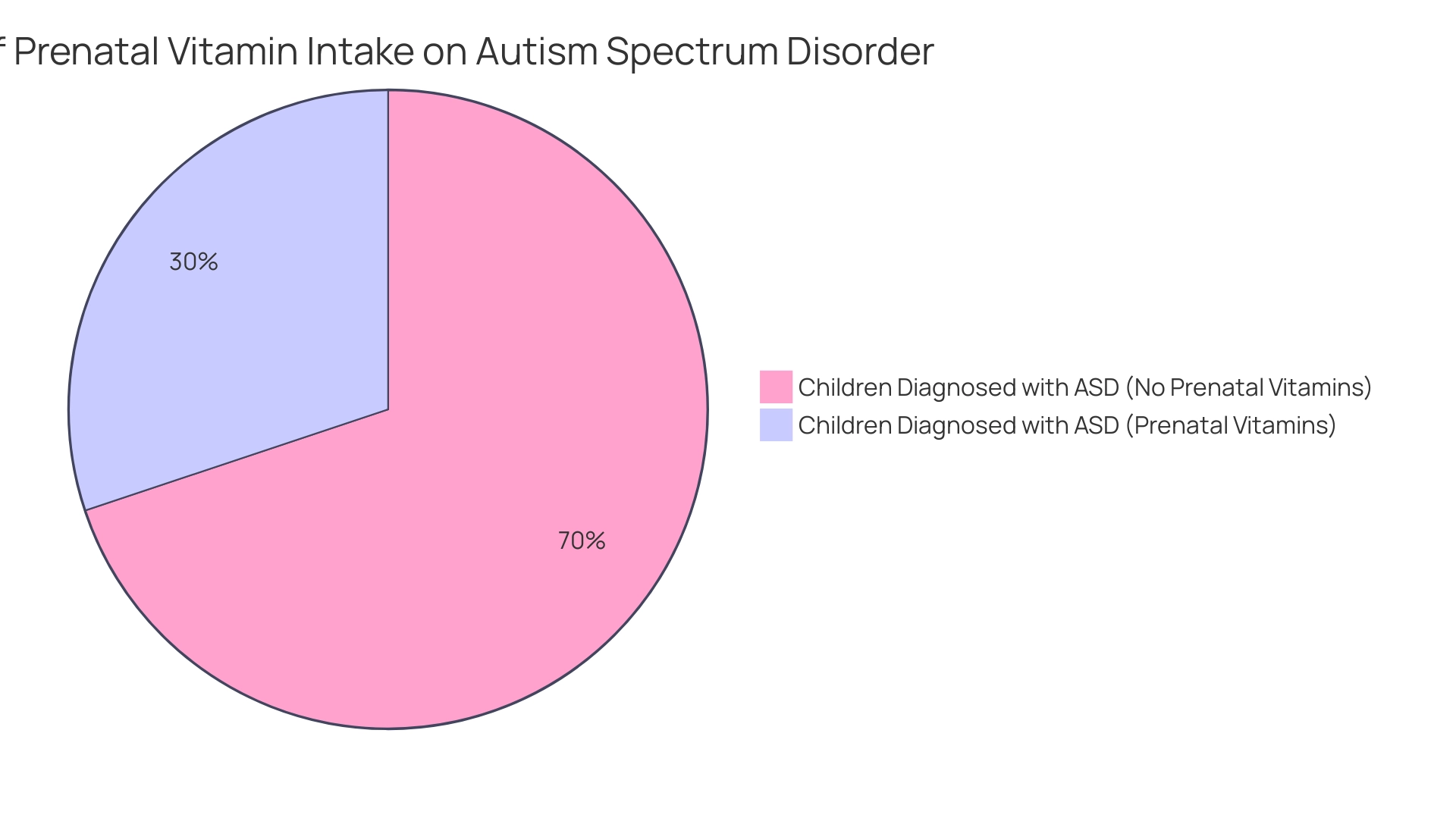Overview
The article addresses how to prevent autism during pregnancy by emphasizing the importance of a healthy lifestyle, avoiding harmful substances, and receiving regular prenatal care. It supports this by detailing specific strategies such as maintaining a balanced diet, managing stress, avoiding toxins, and ensuring adequate folic acid intake, all of which are linked to reducing the risk of Autism Spectrum Disorder (ASD) in offspring.
Introduction
In an age where awareness and understanding of Autism Spectrum Disorder (ASD) are rapidly evolving, parents are increasingly seeking ways to advocate for their children's well-being even before birth. The exploration of prenatal factors that may influence the risk of autism has opened up a dialogue about how lifestyle choices, environmental exposures, and regular healthcare can play a pivotal role in shaping a child's developmental trajectory.
From the significance of a balanced diet and stress management during pregnancy to the importance of regular prenatal check-ups and genetic counseling, parents have the opportunity to make informed decisions that could positively impact their child's future.
This article delves into the multifaceted aspects of autism prevention, offering insights and actionable steps that empower parents to create nurturing environments and advocate effectively for their children's health.
Understanding Autism and Its Preventability During Pregnancy
Autism Spectrum Disorder (ASD) is a complex developmental condition marked by difficulties in social interaction, communication, and the presence of repetitive behaviors. The exploration of its causes is ongoing, with significant attention given to both genetic and environmental factors. Significantly, research highlights how to prevent autism during pregnancy by considering various prenatal factors that can potentially reduce the risk of developmental disorders.
For instance, recent studies indicate that understanding how to prevent autism during pregnancy can empower parents to make informed choices, ultimately supporting their offspring's development. As the Centers for Disease Control and Prevention notes, these changes reflect an improvement in outreach, screening, and de-stigmatization of diagnosis among minority communities, highlighting the evolving landscape of awareness. Furthermore, as of 2024, the prevalence of ASD is a vital statistic in the conversation, with 3.9% of all individuals evaluated for ASD having undergone an assessment that ruled out the condition more recently than a prior confirmation.
This statistic is crucial for understanding the context of prevalence. Additionally, symbols used in autism advocacy, such as the puzzle piece and the rainbow infinity sign, reflect the changing perceptions and advocacy surrounding autism, illustrating the need for continued awareness and understanding. By remaining knowledgeable about these changes, parents can advocate effectively for their offspring's well-being.
The Role of a Healthy Lifestyle in Autism Prevention
During pregnancy, maintaining a balanced diet rich in fruits, vegetables, whole grains, and lean proteins is crucial for both maternal health and fetal growth. Nutritionists emphasize that 'Man is what he eats,' highlighting the direct connection between a mother’s diet and the well-being of her child. It is important to note that the daily requirement of creatine is approximately 2 g in adults, which may play a role in supporting cellular energy levels during fetal growth.
Regular physical activity, such as walking or prenatal yoga, not only fosters physical fitness but also enhances mental well-being, helping to combat the stress that often accompanies pregnancy. Managing stress through mindfulness and relaxation techniques is equally essential, as elevated stress levels can adversely affect fetal development. Additionally, the interplay between genetic predispositions and environmental exposures contributes to the complexity of neurodevelopmental disorders, including autism.
Research indicates that adopting strategies on how to prevent autism during pregnancy can significantly lower the risk of these disorders. A case study on creatine and neurological outcomes suggests that while further research is needed, creatine supplementation may have potential advantages for fetal growth. By prioritizing these elements, parents can create a nurturing environment that supports their child's growth and progress, laying a solid foundation for a healthy future.

Avoiding Harmful Substances and Environmental Toxins
To learn how to prevent autism during pregnancy, it is essential for pregnant individuals to avoid smoking, alcohol, and recreational drugs, as these substances can present significant dangers to fetal development. Studies suggest that understanding how to prevent autism during pregnancy by avoiding harmful substances can have a significant effect on lowering the likelihood of autism. For instance, a hazard ratio of 1.01 has been identified for intellectual disability associated with acetaminophen use, suggesting that even common medications can carry risks.
Furthermore, binge drinking episodes in the preconception period and first trimester have not been associated with ASD or developmental delays, indicating a need for nuanced understanding of substance use. Minimizing exposure to environmental toxins—such as pesticides, heavy metals, and certain household chemicals—is also essential. Opting for organic foods whenever possible and utilizing natural cleaning products can greatly diminish exposure to these toxins.
Proper ventilation in living spaces plays a vital role in maintaining a healthy environment. As Dr. Lyndsay A. Avalos emphasizes,
Future research should further explore patterns of maternal prenatal cannabis use throughout pregnancy and sex-specific associations, highlighting the need for informed choices during this critical period.
Additionally, research on microglial activation suggests that maternal immune activation may lead to changes in microglial function, potentially contributing to behavioral deficits in offspring.
By making conscious, proactive decisions about the substances we use and the environments we inhabit, we can learn how to prevent autism during pregnancy and safeguard our children's health and well-being.
The Importance of Regular Prenatal Care and Monitoring
Regular prenatal visits are essential not only for monitoring the health of the expectant mother but also for understanding how to prevent autism during pregnancy and ensuring the optimal development of the fetus. These appointments allow healthcare providers to assess the growth of the baby, conduct necessary screenings, and offer tailored advice based on the mother’s health status. As Dr. Rebecca J. Schmidt from the University of California, Davis, emphasizes, understanding how to prevent autism during pregnancy includes ensuring maternal intake of folic acid at or above 600 µg, which has been associated with a statistically significant lower risk of autism spectrum disorder (RR, 0.51; 95% CI, 0.31-0.82).
Notably, individuals in the ASD group were statistically significantly more likely to be male compared with individuals in the TD group (69.1% vs 51.6%), highlighting the importance of understanding ASD prevalence. Furthermore, a cohort study titled 'Impact of Prenatal Vitamin Intake on Autism Spectrum Disorder Recurrence' found that:
- 14.1% of children whose mothers took prenatal vitamins were diagnosed with ASD
- 32.7% in those who did not
This indicates that knowing how to prevent autism during pregnancy, such as through maternal daily consumption of prenatal vitamins during the first month, is linked to a decreased likelihood of ASD recurrence in high-risk families.
This emphasizes the significance of addressing any concerns or inquiries with healthcare providers, as they can offer invaluable insights on how to prevent autism during pregnancy. Participating in open discussions during these visits enables parents to actively engage in their child's health journey, creating a setting supportive of healthy fetal development and potentially reducing concerns. It is also important to note that statistical significance was set at p < 0.05, with analyses conducted using SAS software and R, further supporting the findings discussed.

Genetic Counseling: Understanding Your Family's Autism Risk
Genetic counseling serves as a valuable resource for families who have a history of developmental disorders or related conditions. Through this process, a genetic counselor assesses family history and discusses possible concerns, offering tailored recommendations for testing when necessary. This not only empowers parents to understand the nuances of risk but also equips them with the knowledge of how to prevent autism during pregnancy and make informed decisions regarding child-rearing.
Concerns about genetic testing are prevalent; many fear it may lead to discrimination or stigmatization. As one participant articulated,
Knowing the genetic role to being autistic doesn’t help improve our lives and will lead to more discourse around 'curing' autism when being autistic is not bad and doesn’t need to be cured.
This highlights the need for sensitive and supportive counseling approaches.
Notably, only 2.9% of participants (5 individuals) completed the survey with assistance from a parent or sibling, indicating a low engagement level with genetic counseling among families. Recent studies underscore that while identifying genetic variants associated with Autism Spectrum Disorder (ASD) can shed light on prognosis and potential therapeutic interventions, many cases remain without clear genetic explanations. For instance, the case study titled 'Impact of Genetic Variants on ASD Prognosis' emphasizes that while some genetic alterations can inform treatment options, the majority of ASD cases do not have specific medical treatments based on genetic findings, underscoring the complexity of the disorder.
By being proactive and informed about how to prevent autism during pregnancy, parents can navigate these challenges, enhancing their ability to support their child's development effectively.
Conclusion
Understanding the multifaceted nature of Autism Spectrum Disorder (ASD) is crucial for parents aiming to advocate for their children’s well-being. This article highlights the significant role of prenatal factors in potentially mitigating autism risk, emphasizing the importance of:
- A balanced diet
- Stress management
- Regular prenatal care
By making informed lifestyle choices and prioritizing health during pregnancy, parents can create nurturing environments that support optimal fetal development.
Avoiding harmful substances and environmental toxins further contributes to a healthier pregnancy, reinforcing the idea that proactive choices can have lasting impacts. Additionally, the value of genetic counseling cannot be overstated, as it empowers families to understand their unique risks and navigate the complexities of autism with greater awareness.
Ultimately, the journey of advocacy begins long before birth, and by embracing these insights, parents can take meaningful steps to influence their child’s developmental trajectory positively. Empowered with knowledge and resources, parents are well-equipped to foster a supportive atmosphere that nurtures their child's growth and well-being, paving the way for a brighter future.
Frequently Asked Questions
What is Autism Spectrum Disorder (ASD)?
Autism Spectrum Disorder (ASD) is a complex developmental condition characterized by difficulties in social interaction, communication, and the presence of repetitive behaviors.
What factors are being studied as potential causes of ASD?
Research into the causes of ASD focuses on both genetic and environmental factors, with ongoing exploration into how these elements contribute to the condition.
How can parents potentially reduce the risk of autism during pregnancy?
Parents can potentially reduce the risk of autism during pregnancy by considering various prenatal factors, including maintaining a balanced diet, engaging in regular physical activity, and managing stress.
What role does maternal nutrition play during pregnancy?
A balanced diet rich in fruits, vegetables, whole grains, and lean proteins is crucial for maternal health and fetal growth, highlighting the direct connection between a mother’s diet and her child’s well-being.
How much creatine do adults typically need, and why is it important during pregnancy?
Adults typically require approximately 2 grams of creatine daily, which may support cellular energy levels during fetal growth.
What are some recommended physical activities for pregnant women?
Regular physical activities such as walking or prenatal yoga are recommended to foster physical fitness and enhance mental well-being during pregnancy.
Why is stress management important during pregnancy?
Managing stress through mindfulness and relaxation techniques is essential, as elevated stress levels can adversely affect fetal development.
What is the significance of the 3.9% statistic related to ASD prevalence?
The 3.9% statistic indicates the proportion of all individuals evaluated for ASD who have undergone an assessment that ruled out the condition more recently than a prior confirmation, providing context for understanding the prevalence of ASD.
What symbols are commonly associated with autism advocacy?
Common symbols in autism advocacy include the puzzle piece and the rainbow infinity sign, which reflect changing perceptions and advocacy surrounding autism.
How can parents advocate for their child's well-being regarding autism?
By staying informed about changes in awareness, screening, and advocacy related to autism, parents can effectively advocate for their child's well-being.




